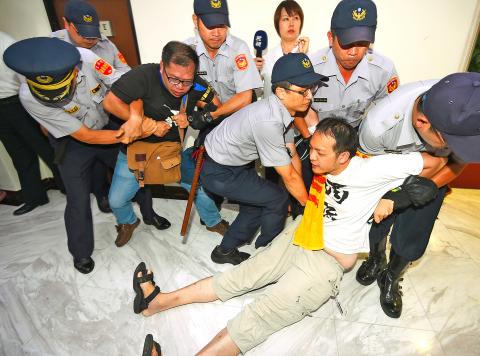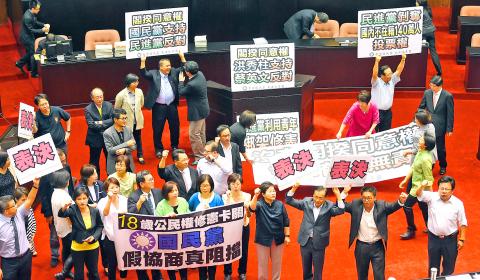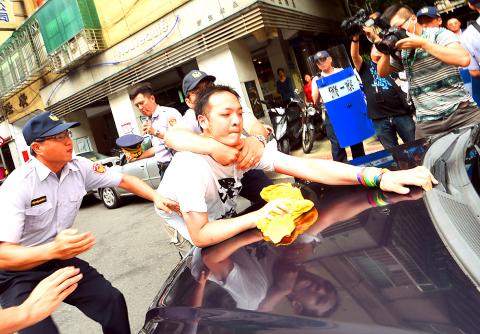Interparty negotiations over constitutional amendments broke down again yesterday, with young protesters, angry over the Chinese Nationalist Party’s (KMT) refusal to separately review controversial amendments on the last day of the legislative session, attempting to storm into KMT caucus whip Lai Shyh-bao’s (賴士葆) office.
The Legislative Yuan had its last plenary meeting yesterday, which was already extended for the legislature to pass the amendments in time for a referendum on the reforms to take place alongside the presidential and legislative elections on Jan. 16. The failure to pass the amendments means the referendum will not take place as planned.
The party caucuses held negotiations yesterday morning intending to iron out the disagreements on how the constitutional amendments should be handled.

Photo: Chang Chia-ming, Taipei Times
The Democratic Progressive Party (DPP) caucus said it proposed that constitutional amendments on which the parties have reached a consensus, such as the lowering of the voting age to 18 and the lowering of the threshold for parties to secure representation in the legislature, be passed in time for the administrative procedures required by the referendum.
It accused the KMT caucus of lacking sincerity with its insistence on bundling amendments for simultaneous legislative passage.
DPP caucus whip Ker Chien-ming (柯建銘) said Lai stressed that it was the KMT leadership pressing for the bundling of the legislature’s power to confirm the premier and absentee voting — the two items that the KMT believes to be the most pressing, but which the DPP opposes — with the lowering of the voting age.

Photo: Chang Chia-ming, Taipei Times
Ker alleged that Lai even proposed a delay to the presidential election — but not the legislative election — which would relieve the pressure for prompt passage of the constitutional amendments, because the referendum, which has to be scheduled on the same day as the elections to guarantee a 50 percent voter turnout for the vote to be valid, could then be postponed to be held with the rescheduled presidential election.
Ker said the KMT, which is likely to nominate Deputy Legislative Speaker Hung Hsiu-chu (洪秀柱) as its presidential candidate, expects a significant challenge for KMT legislative candidates (especially in the south), and that postponing the presidential election — which could allow at least another month for interparty negotiations on the constitutional amendments — would likely reduce Hung’s impact on the legislative election for KMT candidates.
Lai denied proposing the postponement, saying it was put forward by People First Party Legislator Thomas Lee (李桐豪), who, according to Lai, asked DPP Chairperson and presidential candidate Tsai Ing-wen (蔡英文) to promise that she would support allowing the legislature to confirm the premiership.

Photo: Chang Chia-ming, Taipei Times
Lai added that legislative regulations state that bills, unless already having a consensus, could not be put to a vote within one month of negotiations.
A group of young people walked into the building housing legislators’ offices early yesterday afternoon and demanded that Lai answer questions on the issue.
After a standoff with police outside Lai’s office, they were thrown out, with protester Wang Yi-kai (王奕凱) arrested on charges of assault on a police officer.
The protesters demanded to see evidence of Wang’s offense, but said it was not provided.
The police escorted Wang to a patrol car and were able to leave only after a confrontation, in which the protesters blocked the car by lying down in front of it.
DPP Legislator Yu Mei-nu (尤美女) later said that KMT lawmakers failed to appear at an interparty negotiation session scheduled for the afternoon, adding that Lai told her that negotiations were not possible, because of a party leadership directive.
The last general assembly meeting ended at about 6pm, with lawmakers from both parties holding banners and shouting slogans denouncing each other for obstructing the constitutional reforms.

The CIA has a message for Chinese government officials worried about their place in Chinese President Xi Jinping’s (習近平) government: Come work with us. The agency released two Mandarin-language videos on social media on Thursday inviting disgruntled officials to contact the CIA. The recruitment videos posted on YouTube and X racked up more than 5 million views combined in their first day. The outreach comes as CIA Director John Ratcliffe has vowed to boost the agency’s use of intelligence from human sources and its focus on China, which has recently targeted US officials with its own espionage operations. The videos are “aimed at

STEADFAST FRIEND: The bills encourage increased Taiwan-US engagement and address China’s distortion of UN Resolution 2758 to isolate Taiwan internationally The Presidential Office yesterday thanked the US House of Representatives for unanimously passing two Taiwan-related bills highlighting its solid support for Taiwan’s democracy and global participation, and for deepening bilateral relations. One of the bills, the Taiwan Assurance Implementation Act, requires the US Department of State to periodically review its guidelines for engagement with Taiwan, and report to the US Congress on the guidelines and plans to lift self-imposed limitations on US-Taiwan engagement. The other bill is the Taiwan International Solidarity Act, which clarifies that UN Resolution 2758 does not address the issue of the representation of Taiwan or its people in

US Indo-Pacific Commander Admiral Samuel Paparo on Friday expressed concern over the rate at which China is diversifying its military exercises, the Financial Times (FT) reported on Saturday. “The rates of change on the depth and breadth of their exercises is the one non-linear effect that I’ve seen in the last year that wakes me up at night or keeps me up at night,” Paparo was quoted by FT as saying while attending the annual Sedona Forum at the McCain Institute in Arizona. Paparo also expressed concern over the speed with which China was expanding its military. While the US

SHIFT: Taiwan’s better-than-expected first-quarter GDP and signs of weakness in the US have driven global capital back to emerging markets, the central bank head said The central bank yesterday blamed market speculation for the steep rise in the local currency, and urged exporters and financial institutions to stay calm and stop panic sell-offs to avoid hurting their own profitability. The nation’s top monetary policymaker said that it would step in, if necessary, to maintain order and stability in the foreign exchange market. The remarks came as the NT dollar yesterday closed up NT$0.919 to NT$30.145 against the US dollar in Taipei trading, after rising as high as NT$29.59 in intraday trading. The local currency has surged 5.85 percent against the greenback over the past two sessions, central